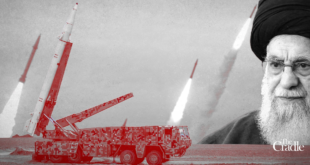An international forum held in Istanbul ended with the release of a declaration reiterating support for the Arab, Muslim and Christian heritage of the city of Jerusalem, condemning Israeli attempts to erode this heritage.The declaration also reiterated the right of return of Palestinians exiled for more than five decades.
Many attendees, however, weren’t satisfied with the outcome, expressing a wish for more innovative solutions to the regional conflict, rather than strongly-worded declarations.
The declaration condemned and rejected “the racist, colonialist measures that seek to wipe out the character of Al-Quds and to encroach upon the national and religious rights of its resilient citizens.â€
The statement also read that “The Zionist occupation of Al-Quds — its Western part in 1948 and its Eastern part in 1967 — is racist and terrorist, based on settlements and replacements. It goes against the flow of history and represents the remains of the colonial phenomenon that was based on injustice, oppression, and exaction of rights.â€
On Palestinian right of return, the declaration said, “It reiterates the right of return to Al-Quds as well as the rest of Palestine, since this is the individual right of all the refugees and those deported; a right that cannot be negotiated or withdrawn. It also reiterates the right of the Palestinian people to exercise all their civic — including political — rights in historical Palestine, like other peoples of the world.â€
This was restated by Head Bishop of the Greek Orthodox Church in Jerusalem Father Attalah Hanna Attalah, who told Daily News Egypt that “Palestine is for the Palestinians and therefore every Palestinian must have the right to return to their home.â€
“I believe that Jerusalem is a holy city,†Attalah continued, “and the right of return is no less holy than our right to Jerusalem. All the Palestinians must be able to return to their country and without that there will be no peace as they say; or peace as they understand it.â€
During the last day of the forum, the Moroccan delegation, the largest one present at the conference with 240 participants, staged a sit-in organized by the Moroccan Justice and Development Party. Carrying slogans, the Moroccan contingent aimed to express the importance of the Palestinian cause and the plight of Jerusalem.
However, not all the attendees were satisfied with the proceedings of the forum as well as its aims. Additionally, some participants felt that the forum had been appropriated by groups with Islamic leanings, devaluing the intended aim of internationalism.
Indeed, the bigger part of the Egyptian delegation attending the conference was affiliated to the Muslim Brotherhood. However, the Egyptian delegation also comprised participants from across the political spectrum, including leftists and Nasserists.
Maha Abu Bakr, an Egyptian participant from the Nasserist Lawyers Group as well as the General Union for Egypt’s Youth Lawyers, told Daily News Egypt that “in truth, when I came to the conference I had hope that we would be seeking some sort of achievable strategy, rather than complain and condemn and call for resistance.â€
“When I heard that this was an international conference, I was very pleased, but I came and found the same thing that has happened [in] so many conferences before, whether local or regional. This was the first time I attend an international conference and I was disappointed,†she said.
“I don’t like the word resistance because it implies a reaction to something. I was hoping that instead we would be taking some sort of initiative,†she added, “I can’t fault the officials at the forum for the entire thing, all of us are part of the same fabric and we all bear some responsibility.â€
Abu Bakr continued, “We don’t have a real plan or strategy except for theories and talk and things unrelated to implementation or the decision makers. The only successful thing we did on the people’s level was the boycott [of Western goods]. I was one of the people boycotting in an orthodox manner, but after a while I don’t know what happened, and I became discouraged.â€
The boycott failed according to Abu Bakr because no further steps were taken to build on its initial success.
“The hegemony and imperialism of the United States and the oppression of Israel depends on interests in the region. If we were able to strike those interests by boycotting, then we would have continued a struggle, similar to the one begun by Ghandi, which helped free his people from the British,†she said.
“The official Arab bodies and governments derive their power from this occupation,†Abu Bakr said, “and it’s what keeps them in their seats … so we must do this together. If I did things alone and someone else doesn’t do their part I will become discouraged because I don’t see a result.â€Â   Â
Journalist and activist Rasha Ali told Daily News Egypt she was also disappointed in the forum and bemoaned the opening statements as “introductions to a celebratory conference. Are we here to talk about politics or say pretty words about Jerusalem?â€
The three-day forum was held in Istanbul, Turkey with 4,000 participants mainly from the Arab and Islamic world and very few from the western world, most notable among them British MP George Galloway.
 Eurasia Press & News
Eurasia Press & News



